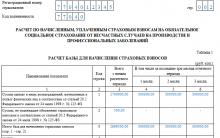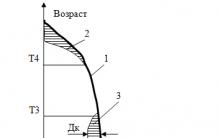Subclause 1 of clause 1 of Article 248 of the Tax Code of the Russian Federation (Tax Code of the Russian Federation, Code) is supplemented with the following sentence: “For the purposes of this chapter, goods are determined in accordance with clause 3 of Article 38 of this Code.”
According to clause 3 of Article 38 of the Tax Code of the Russian Federation, a product for the purposes of the Code is any property that is sold or intended for sale. In order to regulate relations related to the collection of customs duties, goods also include other property defined by the Customs Code of the Russian Federation.
Since clause 1 of clause 1 of Article 248 of the Tax Code of the Russian Federation determines income from the sale of goods (works, services), the requirements for ensuring compliance with clause 3 of Article 38 of the Tax Code of the Russian Federation are directly related only to sold products (goods, works, services). As for accounting, in accordance with paragraphs 4 - 5 of the Regulations on accounting“Income of the organization” PBU 9/99, approved by Order of the Ministry of Finance of Russia dated 05/06/1999 N 32n, this provision concerns income from ordinary activities reflected in account 90 “Sales”.
However, Chapter 25 of the Tax Code of the Russian Federation has not established the procedure according to which income and expenses associated with the sale of fixed assets or material assets are subject to inclusion in non-operating income and expenses (Articles 250 and 265 of the Tax Code of the Russian Federation).
This is confirmed by Article 268 of the Tax Code of the Russian Federation, which established the specifics of determining expenses when selling goods, namely: when selling depreciable property, the taxpayer reduces income by the residual value of the depreciable property, determined in accordance with clause 1 of Article 257 of the Tax Code of the Russian Federation, according to which:
- the residual value of fixed assets put into operation before the entry into force of Chapter 25 of the Tax Code of the Russian Federation was determined as the difference between the replacement cost and the amount of depreciation accrued during the period of operation (taking into account the revaluation of this amount);
- the residual value of fixed assets put into operation after the entry into force of Chapter 25 of the Tax Code of the Russian Federation is defined as the difference between their original (replacement) cost and the amount of depreciation accrued over the period of operation.
In addition, clause 3 of Article 268 of the Tax Code of the Russian Federation established the procedure for recognizing a loss on the sale of depreciable property similar to a loss from the sale of goods, but only this loss is distributed over a period defined as the difference between the period beneficial use and the period of actual operation of the property.
The Supreme Arbitration Court of the Russian Federation in Protest dated 04/11/2000 N 2995/00 against the Resolution of the FAS Moscow District dated 02/09/2000 in case N A40-25345/99-76-428 of the Moscow Arbitration Court indicated that gross profit is the amount of profit (loss) from the sale of products (works, services), fixed assets (including land), other property of enterprises and income from non-sales operations, reduced by the amount of expenses for these operations.
Even despite the fact that regulatory documents (clause 7 of PBU 9/99, Instructions for the application of the Chart of Accounts for accounting financial and economic activities of organizations, approved by Order of the Ministry of Finance of Russia dated October 31, 2000 N 94n, etc.) of the Ministry of Finance of Russia determine the procedure for reflecting proceeds from the sale of fixed assets and other assets in account 91 “Other income and expenses”, the above income is for tax purposes income from the sale of goods.
Signed for seal by A.V. Vladimirov
08/15/2002 "Tax Bulletin", 2002, N 9
Russian enterprise in accordance with the contract concluded with a foreign legal entity to perform work for our enterprise on the territory of the Russian Federation, pays the foreign legal entity an advance payment for the work performed. Should in this case Is tax withheld at source? »
1. Unless otherwise established by paragraph 7 of this article, the following requirements are considered dubious claims:
1) arising in connection with the sale of goods, performance of work, provision of services legal entities And individual entrepreneurs, as well as non-resident legal entities operating in the Republic of Kazakhstan through a permanent establishment, structural unit legal entity, and not satisfied during the three-year period calculated in accordance with paragraph 4 of this article;
2) arising in connection with the sale of goods, performance of work, provision of services to legal entities and individual entrepreneurs, and not satisfied in connection with the recognition of the taxpayer-debtor as bankrupt in accordance with the legislation of the Republic of Kazakhstan;
3) in connection with inclusion in the aggregate annual income fines and penalties on the basis of a final court decision on contracts bank loan(loan) and agreements for the provision of microcredits that were not satisfied during the three-year period calculated in accordance with paragraph 4 of this article.
2. Doubtful claims are subject to deduction from the person who carried out:
1) sale of goods, performance of work, provision of services and who has not ceded the right to such a claim;
2) sale of goods, performance of work, provision of services and the ceded right of such claim;
3) acquisition of the right to claim for goods sold, work performed, services provided from the person specified in subparagraph 2) of this paragraph;
4) inclusion of fines and penalties in the total annual income on the basis of a court decision that has entered into legal force on bank credit (loan) agreements and microcredit agreements.
3. Doubtful claims are subject to deduction from the person:
1) determined by subparagraph 1) paragraph 2 of this article - in the amount including the cost of goods sold, work performed, services rendered, as well as the amount of other claims arising in connection with such sale of goods, performance of work, provision of services, including the amount penalties (fines, penalties), but not more than the amount of previously recognized income;
2) determined by subparagraph 2) of paragraph 2 of this article - in the amount of the positive difference between the amount including the cost of goods sold, work performed, services rendered and the amount of other claims arising in connection with such sale of goods, performance of work, provision of services, including including the amount of penalties (fines, penalties), but not more than the amount of previously recognized income, and the value of the right of claim for which the assignment was made;
3) determined by subparagraph 3) of paragraph 2 of this article - in the amount including the cost of goods sold, work performed, services rendered, as well as the amount of other claims arising in connection with such sale of goods, performance of work, provision of services, including the amount penalties (fines, penalties), but not more than the amount of previously recognized income in accordance with, increased by the cost of acquiring the right of claim;
4) determined by subparagraph 4) paragraph 2 of this article - in the amount of amounts recognized as income determined by subparagraph 13) of paragraph 1.
4. In the cases provided for in subparagraph 1) of paragraph 1 of this article, doubtful claims are subject to deduction in tax period, in which the three-year period calculated:
1) for persons specified in subparagraphs 1) and 2) of paragraph 2 of this article:
In other cases - from the date:
The day following the expiration date of the requirement for sold goods (works, services), the deadline for which has been determined;
Transfer of goods, performance of work, provision of services upon request for goods (work, services) sold, the deadline for which is not defined;
2) for persons specified in subparagraph 3) of paragraph 2 of this article:
For doubtful claims arising under credit (loan) agreements - from the day following the date of the due date for payment of interest in accordance with the terms of the credit (loan) agreement;
For doubtful claims arising under leasing agreements - from the day following the day the lease payment becomes due in accordance with the terms of the leasing agreement;
In other cases - from the date of the latest of the following dates:
The day following the expiration date for the fulfillment of the requirement for sold goods (works, services), the deadline for which has been determined;
The day of assignment of the right of claim for sold goods (works, services), the execution date of which is not defined.
5. In the cases provided for in subparagraph 2) of paragraph 1 of this article, doubtful claims are subject to deduction in the tax period in which the court ruling on the completion of the bankruptcy procedure entered into legal force.
6. In the cases provided for in subparagraph 3) of paragraph 1 of this article, doubtful claims are subject to deduction in the tax period in which the three-year period, calculated from the date of entry into force of the court decision, has expired.
7. The claims of taxpayers entitled to deduct the amount of expenses for the creation of provisions (reserves) in accordance with paragraph 1, for payment accrued after December 31, 2012, are not recognized as dubious claims:
1) interest on deposits, including balances on correspondent accounts placed with other banks;
2) remuneration on loans (except for financial leasing) provided to other banks and clients;
3) accounts receivable on documentary payments and guarantees;
4) contingent liabilities under uncovered letters of credit, issued or confirmed guarantees.
8. Unless otherwise provided for in paragraph 9 of this article, the taxpayer’s attribution of doubtful claims to deductions is carried out while simultaneously complying with following conditions:
1) availability of documents confirming the occurrence of requirements;
2) reflection of claims in accounting at the time of deduction or attribution of such claims to expenses in accounting at previous periods.
9. In the case provided for in subparagraph 2) of paragraph 1 of this article, in addition to the documents specified in paragraph 8 of this article, it is additionally necessary to have a copy of the court ruling on completion of the bankruptcy procedure.
1. Applying the provisions of paragraph 1 of Art. 248, the following must be taken into account:
1) they are given general classification income (about the concept of “income” for the purposes of corporate income tax, see the commentary to Article 247 of the Tax Code). In detail, certain types of income are regulated by other provisions of Chapter. 25 (see, for example, commentary to Articles 250, 251, 291 of the Tax Code);
2) in accordance with them, income for the purposes of corporate income tax includes:
a) income from the sale of goods (work, services) (for example, the income of a contractor who performed work under a contract; the income of a supplier who sold goods to a buyer);
b) income from sales property rights(for example, when assigning rights of claim, see the commentary on this to Article 279 of the Tax Code). In practice, the question arose: are there any contradictions between the norms of paragraph 2 of Art. 38 of the Tax Code (that for tax purposes property rights do not relate to property, which is why Articles 38, 39 of the Tax Code differ significantly from Article 128 of the Civil Code) and the rules of Art. 248 (that income from the sale of property rights is subject to taxation by corporate income tax)? There is no contradiction: in Art. 38, 39 of the Tax Code, it is also possible to sell another object that has cost, quantitative and physical characteristics, and to carry out “other operations” if this is provided for in the Tax Code. In Art. 248 we see special case such “other operations”;
See comment. to Art. 128 Civil Code in the book: Guev A.N. Article-by-article commentary to part one of the Civil Code of the Russian Federation. Ed. 2nd. M.: INFRA-M, 2001.
c) non-operating income (for example, income from rental, sublease of one’s property). The composition of non-operating income is defined in Art. 250 Tax Code (see commentary to it);
3) to exclude the possibility of double taxation of the same object in Art. 248 establishes that the amounts of taxes (for example, value added tax, sales tax) presented to customers and received by the taxpayer are excluded from the income of the corporate income tax payer; these amounts do not participate in determining tax base on corporate income tax;
4) income (mentioned in paragraph 1 of Article 248) is determined on the basis of:
A) primary documents(i.e. those that document business transactions carried out by the organization. They serve as primary accounting documents and must comply with the requirements set out in Article 9 of the Accounting Law, unless otherwise established in the Tax Code, see the commentary on this to Art. 313 - 315 NK);
b) tax accounting documents (for example, analytical tax accounting registers). In Art. 313 - 315 of the Tax Code stipulate the conditions that they must meet (see commentary to them). In practice, the question arose: should non-operating income (and not just income from sales) be determined on the basis of primary documents and tax accounting documents? This question must be answered positively. It is no coincidence that in para. 3 p. 1 art. 248 refers to income in general (i.e., including non-operating income);
5) although the composition of income from sales and non-operating income is determined in Art. 249, 250 NK, this does not mean that in other norms Ch. 25 of the Tax Code there are no rules regulating this issue (see, for example, commentary to Articles 318 - 333 of the Tax Code, devoted to the accounting of income; Article 290 of the Tax Code, devoted to the peculiarities of determining the income of banks; to Article 293 of the Tax Code, devoted to determining the income of insurers) .
2. Analysis of the rules of paragraph 2 of Art. 248 allows us to draw a number of important conclusions:
a) they specify (in relation to the Tax Code) the general rules of Art. 11 of the Tax Code that the Tax Code applies the institutions, concepts and terms of civil legislation in the meaning in which this branch of legislation uses them, but only to the extent that otherwise is not provided for in the norms of the Tax Code itself. In paragraph 2 of Art. 248 we just encounter other rules (different from the norms of the Civil Code devoted to donation) in relation to gratuitous transfer to another person:
Property (for example, goods, land plot, securities, art. 128 Civil Code);
Works, services (for example, free provision of legal services). It should be borne in mind that in accordance with paragraphs 4, 5 of Art. 38 NK:
"4. For tax purposes, work is recognized as activity the results of which have a MATERIAL expression and can be implemented to meet the needs of the organization and (or) individuals.
5. For tax purposes, a service is recognized as an activity, the results of which DO NOT HAVE MATERIAL expression, are sold and consumed in the process of carrying out this activity" (emphasis added - A.G.);
Property rights (for example, rights of claim, see the commentary on this to Article 279 of the Tax Code);
b) gratuitous transfer of the above-mentioned benefits is available in the case when:
Their receipt is not associated with the occurrence of a counter obligation on the recipient to transfer property (property rights), work, goods to the transferor. In practice, the question arose: are there any contradictions between Art. 575 of the Civil Code (prohibiting donation in relations between commercial organizations) and Art. 248 NK? Of course, there is a contradiction if the value of the gratuitously transferred benefit (for example, property) exceeds 5 minimum wages (currently 500 rubles). In this case, the norms of the Civil Code have priority (i.e., there is an illegal transaction), but the object of taxation nevertheless arises: the conclusion was made on the basis of a systematic interpretation of Art. 2, 575 Civil Code, Art. 11, 38, 248 NK.
See more about this in the book: Guev A.N. Article-by-article commentary to part two of the Civil Code of the Russian Federation. Ed. 3rd. M.: INFRA-M, 2001. P. 166.
3. In accordance with the rules of paragraph 3 of Art. 248:
a) income expressed in foreign currency(not only in hard currency, but also in other foreign currencies, for example in Ukrainian hryvnia):
Taken into account in conjunction with other income of the taxpayer (i.e. expressed in rubles). It is impossible to separately tax corporate profits on income in rubles and income in foreign currency;
Official text:
Article 248. Procedure for determining income. Income classification
1. Income for the purposes of this chapter includes:
1) income from the sale of goods (work, services) and property rights (hereinafter referred to as income from sales).
For the purposes of this chapter, goods are defined in accordance with paragraph 3 of Article 38 of this Code;
2) non-operating income.
When determining income, the amounts of taxes presented in accordance with this Code by the taxpayer to the buyer (acquirer) of goods (work, services, property rights) are excluded from them.
Income is determined on the basis of primary documents and other documents confirming the income received by the taxpayer, and tax accounting documents.
Income from sales is determined in the manner established by Article 249 of this Code, taking into account the provisions of this chapter.
Non-operating income is determined in the manner established by Article 250 of this Code, taking into account the provisions of this chapter.
2. For the purposes of this chapter, property (work, services) or property rights are considered received free of charge if the receipt of this property (work, services) or property rights is not associated with the occurrence of an obligation on the recipient to transfer the property (property rights) to the transferor (to perform for the transferor person of work, to provide services to the transferring person).
3. Income received by a taxpayer, the value of which is expressed in foreign currency, is taken into account in conjunction with income, the value of which is expressed in rubles.
Income received by the taxpayer, the value of which is expressed in conventional units, is taken into account in conjunction with income, the value of which is expressed in rubles.
Recalculation of the specified income is carried out by the taxpayer depending on the accounting policy for tax purposes, the method of recognizing income in accordance with Articles 271 and 273 of this Code.
For the purposes of this chapter, amounts reflected in the taxpayer’s income are not subject to re-inclusion in his income.
Lawyer's comment:
This article does not contain the concept of income, therefore, it is necessary to be guided by the provisions of Article 41 of the Tax Code of the Russian Federation, according to which any income can be recognized as such if two conditions are simultaneously present: economic benefit and its actual assessment, as far as possible.
Income in Article 248 is grouped into the following types:
1) income from sales;
2) non-operating income.
The first type includes income from the sale of goods (works, services) and property rights. In accordance with Article 38 of the Tax Code of the Russian Federation, a product is any property sold or intended for sale. For tax purposes, work is recognized as activity whose results have a material expression and can be implemented to meet the needs of the organization and individuals. A service is an activity whose results do not have material expression and are sold and consumed in the process of carrying out this activity. As for property rights, in accordance with the provisions of Article 38 they are excluded from the composition of property.
By virtue of Article 11 of the Tax Code of the Russian Federation, the institutions, concepts and terms of civil, family and other branches of legislation of the Russian Federation used in the Tax Code are applied in the meaning in which they are used in these branches of legislation, unless otherwise provided by the Tax Code. Therefore, when understanding the meaning of the institution “property rights” for tax purposes, one should refer to civil law.
Article 248 repeats the norm of the previous legislation that when determining income, the amounts of taxes presented in accordance with the Tax Code by the taxpayer to the buyer (acquirer) of goods (work, services) or property rights must be excluded. Taxation of income tax on funds received by the taxpayer from buyers in the form of tax presented does not create an economic benefit for the taxpayer, therefore, it is not income.
The thesis that the taxpayer is obliged to determine his income on the basis of primary documents and tax accounting documents means, first of all, that the taxpayer must be guided by the Accounting Law. In accordance with Article 9 of this Law, the primary accounting documents are supporting documents that must be used to document any business transactions.
Primary accounting documents are accepted for accounting if they are drawn up in the form contained in the albums of unified forms of primary accounting documentation, and documents whose form is not provided for in these albums must contain the following mandatory details:
Name of the document;
- date of preparation of the document;
- name of the organization on behalf of which the document was drawn up;
- content of a business transaction;
- measuring business transactions in physical and monetary terms;
- names of positions of persons responsible for carrying out a business transaction and the correctness of its execution;
- personal signatures of these persons.
The list of persons authorized to sign primary documents is approved by the head of the organization in agreement with the chief accountant. Documents used to formalize business transactions involving funds are signed by the head of the organization and the chief accountant or persons authorized by them. The primary accounting document must be drawn up at the time of the transaction, and if this is not possible, immediately after its completion.
Timely and high-quality execution of primary documents, their transfer to established deadlines for reflection in accounting, as well as the reliability of the data contained in them, is ensured by the persons who compiled and signed these documents. Making corrections to cash registers and bank documents not allowed. Corrections can be made to other primary accounting documents only by agreement with the participants business transactions, which must be confirmed by the signatures of the same persons who signed the documents, indicating the date of the corrections.
To control and streamline the processing of data on business transactions, consolidated accounting documents are compiled on both paper and computer media based on primary documents. However, if they are compiled on machine sources of information, the organization must make at its own expense copies of such documents on paper media for other participants in business transactions, as well as at the request of tax control authorities.
Paragraph 2 of Article 248 determines in which cases property (work, services) or property rights are considered received free of charge. Within the meaning of this paragraph, everything depends on whether such receipt is associated with the emergence of an obligation on the recipient to perform work for the transferring person, provide him with a service, or transfer property (property rights).
Firstly, commercial organizations should pay attention to the provisions of Article 575 of the Civil Code, according to which donations are not allowed, with the exception of ordinary gifts, the value of which does not exceed five established by law minimum sizes remuneration in relations between commercial organizations. Consequently, if the gratuitous transfer of property (work, services) in an amount exceeding the established Civil Code, will be carried out on the basis of an agreement, such an agreement may be declared void.
Secondly, in the formal application of this paragraph a whole series transactions that are essentially compensated may not be recognized as such for income tax purposes, which may lead to controversial situations between tax authorities and taxpayers.
Paragraph 3 of Article 248 establishes the obligation of taxpayers to take into account income, the value of which is expressed in foreign currency, in conjunction with income, the value of which is expressed in rubles. In the same way, income is taken into account, the value of which is expressed in conventional units. Income in foreign currency is converted into rubles at the official exchange rate of the Central Bank of the Russian Federation on the date of recognition of these incomes, which is determined according to the rules of Article 271 for the accrual method and according to the rules of Article 273 of the Tax Code of the Russian Federation for the cash method.
New edition of Art. 248 Tax Code of the Russian Federation
1. Income for the purposes of this chapter includes:
1) income from the sale of goods (work, services) and property rights (hereinafter referred to as income from sales).
For the purposes of this chapter, goods are defined in accordance with paragraph 3 of Article 38 of this Code;
2) non-operating income.
When determining income, the amounts of taxes presented in accordance with this Code by the taxpayer to the buyer (acquirer) of goods (work, services, property rights) are excluded from them.
Income is determined on the basis of primary documents and other documents confirming the income received by the taxpayer, and tax accounting documents.
Income from sales is determined in the manner established by Article 249 of this Code, taking into account the provisions of this chapter.
Non-operating income is determined in the manner established by Article 250 of this Code, taking into account the provisions of this chapter.
2. For the purposes of this chapter, property (work, services) or property rights are considered received free of charge if the receipt of this property (work, services) or property rights is not associated with the occurrence of an obligation on the recipient to transfer the property (property rights) to the transferor (to perform for the transferor person of work, to provide services to the transferring person).
3. Income received by a taxpayer, the value of which is expressed in foreign currency, is taken into account in conjunction with income, the value of which is expressed in rubles.
Income received by the taxpayer, the value of which is expressed in conventional units, is taken into account in conjunction with income, the value of which is expressed in rubles.
The specified income is recalculated by the taxpayer depending on the income recognition method chosen in the accounting policy for tax purposes in accordance with Articles 271 and 273 of this Code.
For the purposes of this chapter, amounts reflected in the taxpayer’s income are not subject to re-inclusion in his income.
Commentary on Article 248 of the Tax Code of the Russian Federation
The income that a taxpayer receives is divided into income from sales and non-operating income. Moreover, the first type of income includes proceeds from the sale of goods (works, services), property rights. What is considered a product for tax purposes is stated in Art. 38 Tax Code of the Russian Federation. This is any property of the organization that is being sold or intended for sale. That is, in addition to the goods themselves and finished products, this also includes sold fixed assets, raw materials, materials, etc.
Clause 2 of Art. 248 of the Tax Code of the Russian Federation determines that goods (work, services) and property rights are considered received free of charge if the taxpayer is not obliged to transfer his property (property rights) or perform work (provide services) in exchange for them.
Taxes collected from buyers are excluded from income amounts. indirect taxes: VAT and excise taxes.
Income can be expressed both in rubles and in foreign currency. The latter must be converted into rubles at the exchange rate Central Bank RF, which is established on the date of recognition of these incomes.
Taxable income is determined on the basis of primary documents, other documents, one way or another, confirming income, as well as tax accounting documents. Tax accounting dedicated to Art. - .
Please note: the wording “other documents confirming the income received by the taxpayer” appeared in the Code only in 2006. In other words, from this year, fiscal officials can include in the company’s income receipts based on any paper that at least indirectly indicates the receipt of income. It is clear that such a free interpretation of the legislation cannot but become a reason legal proceedings. After all, it is possible that the most zealous inspectors may consider, say, the amount specified in the framework agreement to be income.
Another comment on Art. 248 Tax Code of the Russian Federation
The principles for determining income are laid down in Article 41 of the Tax Code.
When applying Article 248 of the Tax Code, one should take into account how to “calculate” income.
First of all, we turn to the provisions of Articles 248 and 249 of the Tax Code.
Income for the purposes of Chapter 25 of the Tax Code includes, in particular, income from the sale of goods (work, services) and property rights.
The definition of income from sales is given in paragraph 1 of Article 249 of the Tax Code.
Thus, income from sales is recognized as proceeds from the sale of goods (works, services) both of one’s own production and those previously acquired, and proceeds from the sale of property rights.
If the transactions in question fall under the conditions specified therein, we determine the proceeds from sales based on all receipts associated with payments for goods sold(works, services) or property rights expressed in cash and (or) in kind.
The price of goods, works or services is determined based on the terms of the contract, unless otherwise provided by Article 40 of the Tax Code.
Depending on the method of recognition of income and expenses chosen by the taxpayer, receipts related to payments for goods sold (work, services) or property rights are recognized for profit tax purposes in accordance with Article 271 or Article 273 of the Tax Code.
In accordance with paragraph 3 of Article 271 of the Tax Code for income from sales, unless otherwise provided by Chapter 25 of the Tax Code, the date of receipt of income is the date of sale of goods (work, services, property rights), determined in accordance with paragraph 1 of Article 39 of the Tax Code, regardless of the actual receipts cash(other property (work, services) and (or) property rights) in payment for them. When selling goods (works, services) under a commission agreement ( agency agreement) by the taxpayer-committent (principal), the date of receipt of income from the sale is recognized as the date of sale of property (property rights) belonging to the committent (principal), indicated in the notice of the commission agent (agent) on the sale and (or) in the report of the commission agent (agent).
According to paragraph 1 of Article 273 of the Tax Code, organizations (with the exception of banks) have the right to determine the date of receipt of income (expenses) using the cash method, if on average for the previous four quarters the amount of revenue from the sale of goods (work, services) of these organizations excluding tax added value did not exceed one million rubles for each quarter.
In this case, by virtue of paragraph 2 of Article 273 of the Tax Code, the date of receipt of income is recognized as the day of receipt of funds into bank accounts and (or) the cash desk, receipt of other property (work, services) and (or) property rights, as well as repayment of debt to the taxpayer in another way (cash method). In accordance with paragraph 5 of Article 273 of the Tax Code, taxpayers who determine income using the cash method do not take into account amount differences in income for tax purposes if, under the terms of the transaction, the obligation (claim) is expressed in conventional monetary units.
- Up











Carrying out an inventory
Ulyukaev, Navka and Patrushev
Income tax refund for treatment: registration procedure and calculation of the deduction amount
Import substitution - what is it?
OSAGO minimum insurance period